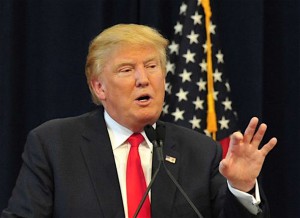
President Donald Trump's "border tax" plan is getting a lukewarm reception from the Republican Party.
Republican concerns about Trump administration policies on trade and trade agreements continue to expand, according to The Hill, a political website that monitors Congress.
Trump’s “border tax,” which is part of what the President has described as an effort to bring manufacturing jobs back to the U.S., has been meet coolly in the GOP controlled Senate even though it has been blessed by House Speaker Paul Ryan who sees it as a way to offset the revenue loss that follow a sweeping tax reform package Trump is also promising to deliver.
However, with the price of wheat, corn and soybeans falling, trade is also quickly emerging as a major issue for Republican lawmakers, who are increasingly worried about Trump’s promises to tear up the North American Free Trade Agreement and his decision to scuttle the Trans Pacific Partnership.
Republicans from farm states are getting especially agitated because commodity prices have slumped and farmers need to increase their exports to survive financially. Wheat, corn and soybeans are piling up in silos while Congress waits for a clear signal from the Trump administration.
Lawmakers are seeking a more precise understanding of where President Trump is headed on trade and are asking who in the administration is in charge of policies that could affect their home-state economies, according to The Hill.
“I’m not sure where they’re going,” Sen. John Thune (R-S.D.), the third-ranking member of the GOP leadership, who attended the meeting with Peter Navarro, who heads the White House office on trade and industrial policy, and Jason Greenblatt, the administration’s special representative for international negotiations, told the site.

Iowa's GOP Sen. Chuck Grassley is concerned with Trump's trade policies, noting that many of our trade partners retaliate against the U.S. when we do something they don't like.
“They clearly have a different view on some of these trade matters than has been the sort of traditional Republican trade view on Capitol Hill,” Thune told The Hill.
Thune said the message to the Trump administration is that if it doesn’t like multilateral trade deals like TPP and NAFTA, which has had a huge impact on the car industry, then it needs to be aggressive in negotiating bilateral trade deals to take their place.
(To see more about Trump’s proposed import tax, Click Here.)
“If you don’t like NAFTA then we need (bilateral agreements) with these countries. Let’s get after it. The concern is we lose ground if we don’t,” said Thune, who sits on the Finance Committee, which has jurisdiction over trade and represents a state heavily dependent on agriculture.
“It’s one thing just to come in with a wrecking ball and another thing to come in and say, ‘Look, let’s take a look at this and see how we can improve it,’” said Sen. Pat Roberts (R-Kan.), chairman of the Agriculture Committee and a member of the Finance panel, which has jurisdiction over trade.
“With all due respect, Mr. Greenblatt and Mr. Navarro outlining 13 policy guidelines and four goals in minute detail is not the same thing as announcing several countries they’re working with to get strong bilateral trade agreements,” Roberts added.
Trump told Canadian Prime Minister Justin Trudeau recently that he only wanted relatively minor changes made to NAFTA and told reporters “we’ll be tweaking it.”
But one of the 13 points that administration trade officials shared with GOP lawmakers asserted “Canadians have ‘played us,’” making reference to chapter 19 of the treaty, which addresses the dispute settlement process when there are allegations of dumping and countervailing duties.
(Talks to renegotiate NAFTA likely to start in May. Click Here for the story.)
“There’s concern about who’s in charge. There’s concern about the direction of the administration,” said a senior GOP aide.
“There’s nothing like seeing a silo that’s full and a whole mound of grain on the ground with a cover on it,” Roberts said.
“Commodity prices are so low that farmers aren’t going to make it,” said Sen. Cory Gardner (R-Colo.). “Trade allows us to have an outlet for our supply right now. We have piles of corn sitting in the countryside.
“We need to open up new avenues of trade. NAFTA has been an incredible asset for Colorado. I think we have to make it clear that we believe in trade. Trade is important to agriculture, and to tech,” Gardner noted, two important industries in his home state. “We have to advance, not set back trade.”
Some lawmakers were alarmed by reports that Mexico is exploring a deal to buy corn from Brazil and Argentina instead of the United States to retaliate against Trump’s threats of tariffs on Mexican imports.
(Trump threatens Canada, Mexico, with new border tariffs. Click Here for the story.)
“We’ve got plenty of history of when we do something some country doesn’t like then they retaliate against us,” said Sen. Chuck Grassley (R-Iowa), a senior member of the Finance and Agriculture Committees.
